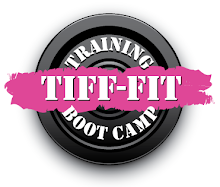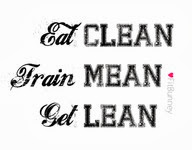Pro-Rated Boot Camp Session
Yay Burpees!
You know it, baby!
Tiff-Fit

That's how we roll!
Tuesday, March 26, 2013
How to Stop Sweet Cravings
Cravings are a sign from your body that it needs something - either because of a deficiency in your diet or an addiction. Women get sweet cravings the week before or week of their menstruation because their bodies need more carbohydrates at this time. If you get daily sweet cravings, it's most likely your body is addicted to the sugar boost. It takes time to eliminate an addictive craving, but following these steps will get you there.
1.Substitute fruits and juices for candy and sweets. The sugars in fruits are digested differently than the empty calories of white sugar that are in most candy and processed foods. The fiber in fruit also slows the absorption of the sugars so you don't get as high a sugar rush (and as low a crash).
2.Go for quality, not quantity. Eat a small piece of 70% dark chocolate instead of a candy bar. Have a small scoop of gourmet ice cream instead of a bowl of light ice cream. The treat will be more satisfying and you'll be consuming less sugar overall.
3.Avoid artificial sweeteners. Studies have shown that eating foods with artificial sweetener (i.e. diet sodas) can increase the frequency of sweet cravings.
4.Wait 10 minutes. Do something else. If, after 10 minutes, you still want sweets, have a small treat. Most of the time, you will discover the craving has vanished.
5.Don't go cold turkey. Reduce the size of your treats instead. If you're sugar cravings are frequent, eliminating sweets all together will set you up for failure. Slowly cutting back on the amount of sugar you eat will help reduce the frequency of cravings
6.Improve your diet overall. Whole grains, healthy fats and lean meats (animal that run most of their lives, not stand around all day eating) make you feel full and satisfied.
7.Small frequent meals help keep your blood sugar level and eliminate your body's need for a quick sugar fix.
Friday, March 22, 2013
Effective Strategies When Eating Out
Develop a plan in advance
Eat a small, healthy snack before dining out
Load up on vegetables
Include a lean protein source
Make simpler, healthier changes to the meals you enjoy
Drink plenty of water and eat slowly
Listen to your body
I’d like low-calorie dressing on the side, please.
Thursday, March 21, 2013
Clean Eating
What exactly does eating clean mean? Clean eating is not just a diet; it’s a lifestyle. The commitment to this type of eating is full time. It’s not about denying yourself or going hungry. It’s about eating with thought and planning. Athletes rely on superior nutrition to keep their bodies tight and lean. Now you may not want to look like they do since muscularity is an acquired taste (I know I sure would though!), but everyone wants to have more definition and tone and less fat. By adopting a clean eating lifestyle your body will have a chance at looking its all-time best.
Clean eating is a way of nourishing yourself. The backbone of clean eating nutrition depends heavily on an assortment of fresh vegetables and fruits, whole grains, and lean protein, eaten at regular intervals over the course of a day. Clean eating is NOT a diet you follow for a few painful months, denying yourself certain foods. It’s a lifestyle, not a fad diet. Think about it--if you usually eat protein, carbs, and fat as you should, and then you remove one of those food groups from your eating plan, you’ll lose weight. But only while on the plan. Once you reintroduce foods you haven’t been eating during your dieting phase, BAM! You gain weight all over again and usually a great deal more than you lost in the first place. This is the phenomenon known as yo-yo dieting.
Are you one of those people who exercises like crazy but never sees results? You scratch your head in dismay when you catch a glimpse of yourself in the mirror, confused as to why the exercise makes so little difference. Want to know what the problem is??? It’s your nutrition!!! NO amount of exercise will reshape your body without appropriate nutrition! You can’t out-train a bad diet!
Clean eating involves several principles of eating. You will have to eat more but make better food choices, eat regularly so you do not go hungry, throw out the junk in your trunk, and get ready for the new improved you. Start by discarding the notion that you must eat only three meals a day and the biggest meal should be dinner. Eating clean means eating several smaller meals throughout the day. By doing so you don’t go hungry and your metabolism burns steadily all day. If you do it right, you won’t experience those “hit the wall” feelings that leave you reaching for a coffee or chocolate. Dinner won’t be the biggest meal of your day as it probably is now. Think about it--does it make sense to fill yourself up with calories you won’t burn off after dinner? Instead consume foods like breads and starches at the beginning of the day when you are more likely to be the busiest and have a better chance of burning the calories away.
You may experience the feeling of lethargy that arrives around mid-morning or mid-afternoon, or sometimes at both of those times. That horrible “hit the wall” feeling is due to falling blood sugar and unstable insulin levels. You can solve this problem by eating a combination of complex carbs and lean proteins. Together they offset unstable blood and insulin levels by prolonging digestion and slowing the release of sugar into the bloodstream. As a result, insulin and blood sugar levels remain steady and you feel better. By eating protein with your complex carbohydrates, you’ll slow the carb-to-fat conversion process even more. This is why you should never eat complex carbs alone. Always pair carbs with protein.
Wednesday, March 20, 2013
Clean Eating Principles
- Eat 5-6 small meals every day
- Eat every 2-3 hours
- Combine lean protein and complex carbs at every meal
- Drink at least 2 liters or 8 cups of water each day
- Never miss a meal, especially breakfast
- Carry a cooler loaded with eat-clean foods to get through the day
- Avoid all over-processed, refined foods, especially white flour and sugar
- Avoid saturated and trans fats
- Avoid sugar-loaded colas and juices
- Consume adequate healthy fats (EFAs) each day
- Avoid alcohol--another form of sugar
- Avoid all calorie-dense foods that contain little or no nutritional value
- Depend on fresh fruits and vegetables for fiber, vitamins, and enzymes
- Stick to proper portion sizes--give up the super-sizing!
Tuesday, March 19, 2013
Some Diet Myths
MYTH: Skipping meals can help with weight loss.
FACT: Most people who skip meals tend to overeat later in the day.
MYTH: Eating in the evening causes weight gain.
FACT: The time that you eat does not affect weight gain. It is the amount of calories you take in during the entire day.
MYTH: Some foods like grapefruit and cabbage help to burn fat.
FACT: No food burns fat. Reduced calories eaten and daily physical activity is the best way to lose weight and burn fat.
MYTH: Quick weight loss diets equate to permanent weight loss.
FACT: Quick weight loss diets are typically water losses that will be regained. A slow weight loss of 1-2 lbs. per week is most effective long-term.
MYTH: I can lose weight while eating whatever I want.
FACT: To lose weight, you need to use more calories than you eat. It is possible to eat any kind of food you want and lose weight. You need to limit the number of calories you eat every day and/or increase your daily physical activity.
MYTH: Low-fat or nonfat means no calories.
FACT: A low-fat or nonfat food is often lower in calories than the same size portion of the full-fat product. But many processed low-fat or nonfat foods have just as many calories as the full-fat version of the same food or even more calories. They may contain added sugar, flour, or starch thickeners to improve flavor and texture after fat is removed. These ingredients add calories.
MYTH: High-protein/low-carbohydrate diets are a healthy way to lose weight.
FACT: The long-term health effects of a high-protein/low-carbohydrate diet are unknown. But getting most of your daily calories from high-protein foods like meat, eggs, and cheese is not a balanced eating plan.
MYTH: It is less fattening to drink juice than milk.
FACT: A glass of juice contains more calories than a glass of 1% milk. While juice contains mostly sugar and some vitamins, milk has more nutrients such as protein, calcium, potassium and Vitamin D.
MYTH: Dairy products are fattening and unhealthy.
FACT: Low-fat and nonfat milk, yogurt, and cheese are just as nutritious as whole milk dairy products, but they are lower in fat and calories. Dairy products have many nutrients your body needs. They offer protein to build muscles and help organs work properly, and calcium to strengthen bones. Most milk and some yogurts are fortified with vitamin D to help your body use calcium.
MYTH: Drinking wine instead of beer it is better.
FACT: It is simply not true. One glass of wine (5 oz) contains ~130 kcal where as one bottle of beer (12 oz) has ~150 kcal. Remember, the sweeter the wine, the more sugar and calories it contains. By the same token for hard liquor; the higher the proof, the higher the calories.
MYTH: Starches are fattening and should be limited when trying to lose weight.
FACT: Many foods high in starch, like bread, rice, pasta, cereals, beans, fruits, and some vegetables (like potatoes and yams) are low in fat and calories. They become high in fat and calories when eaten in large portion sizes or when covered with high-fat toppings like butter, sour cream, or mayonnaise.
MYTH: Nuts are fattening and you should not eat them if you want to lose weight.
FACT: In small amounts, nuts can be part of a healthy weight-loss program. Nuts are high in calories and fat. However, most nuts contain healthy fats that do not clog arteries. Nuts are also good sources of protein, dietary fiber, and minerals including magnesium and copper.
How to Keep a Food Diary
You may have to keep a food diary for medical reasons or you may just be interested in tracking your eating habits. Whatever the reason, here's how to take the hassle out of doing it.
Steps
1.Buy a ruled notebook if you are planning to do this for any longer than a week. If you use scraps of paper for a length of time, they will eventually get messy and scattered.
2.Take time to prepare the notebook for tracking food. You don't have to do every page, but you'll need to do enough to keep you going for a couple of days. Nothing stops motivation dead more than not having the page you need prepared.
3.Consider how to lay out the page. If you just need a simple food diary, you can just date the page and then write down the times you eat and what you eat. If you need a more complex food diary, you may need to rule the page up into columns.
4.Remember to take your food diary with you and write in it as soon as you can after eating. It's much easier than getting to the end of the day and having to try and remember what you ate.
Tips
•If you are keeping the food diary because you want to lose weight or because you have an eating disorder, it can sometimes help to have a "How I felt when I ate this" column. This will help you keep track of the reasons you eat.
Monday, March 18, 2013
7 Reasons Why Keeping a Food Journal Helps
Let’s face it. That iron trap of a vault you call your mind can, at times, let important information leak out. Hey, it happens to all of us. So if you’re health conscious and want to keep an accurate record of what you eat, a food journal is really necessary. Let’s look at some of the ways this visual reminder of your culinary exploits can help you out.
1. A journal records specifically what you ate and drank– Fairly obvious, referencing the items you ingest lets you know, well, what you ate and drank. Keeping a record of it leaves nothing to chance. If you’re trying to maintain a specific calorie regimen, this is a very easy way to know when you’re reaching the “I Better Not Eat That” tipping point. You might just be surprised what sneaks its way into your belly during the course of a day or week.
2. A journal helps you plan– Going to a dinner party and can’t decide if you can really afford the extra calories? By reviewing your food journal, you can easily decide whether or not it’s salad or shrimp for the evening. It just plain takes the guess work out of what you ate.
3. You can stabilize your weight– If you’ve reached your ideal weight, congratulations! But now you need to maintain it. And to do that, a food journal can help you stick to the calorie level that keeps your metabolism running at optimum speed. Remember, it’s not about dieting. It’s about changing your lifestyle.
4. Psychoanalyze yourself—OK, you’re no psychiatrist. But this is important in that it can enlighten you as to why you decided to eat something. Perhaps you were anxious, sad, or depressed. Maybe you were elated, tired or bored. Whatever the case, carefully recording your feelings could just be the key to revealing the root cause of your eating struggles. Recognizing this one fact could well be the epiphany to a new you.
5. It helps hold you accountable– Once you get in the habit of noting what you eat, you may well find that it becomes second nature. Sort of like brushing your teeth. Reviewing your journal means you’re going to answer to the toughest critic of all– yourself– if you slip up. But that’s not so bad. Use the experience to prepare for the next meeting with you so that you’ll be able to present better results…to you.
6. It works!– In a study of 1,700 obese men and women by Kaiser Permenante, those keeping a journal of what they ate lost significant amounts of weight. And, their record keeping was not perfect. But the fact they made an effort resulted in the lost pounds.
7. You can see what’s missing in your diet– If you are not eating green vegetables, you could be lacking in several nutrients such as vitamin E, zinc, folic acid the B vitamins, magnesium, iron and others that keep your body strong and healthy. Flipping through a journal that records your foods, you can easily spot these deficiencies and you can act to correct them.
Tuesday, March 5, 2013
Grocery Shopping
Are you a NASCAR driver hugging the outside food isles OR riding a horse and carriage strolling aimlessly up and down every isle?
Grocery shopping is a fact of life and is a reoccurring endeavor. For some, it's an ordeal lasting over an hour. For others, it's a maze of headaches. My friends, it doesn't have to be this way.
If you had the opportunity to take care of your grocery shopping in less than 30 minutes, would you go for it?
I'm giving you what I believe is a simple but comprehensive food list that provides the energy and building blocks for successful training, physique goals, and general wellness. Examine the list and compare it to your grocery list...assuming you keep one. :)
proteins
chicken breast
beef
fish
cottage cheese
yogurt (Greek, milk, soy - live and active cultures)
milk
eggs (cage free, free roaming, organic whole eggs, 100% egg-white)
fibrous vegetables - complex carbs
cruciferous vegetables (broccoli, cauliflower, brussels sprouts, cabbage, kale, and bok choy)
asparagus
cilantro
mushrooms
peppers (green, red, yellow, orange)
romaine lettuce
snow peas
spinach
tomatoes
mixed vegetables (frozen)
fibrous fruits - simple carbs
apples
bananas
grapefruit
melon
mixed berries
oranges
peaches
starches - complex carbs
brown rice
mixed beans
old-fashioned oatmeal
quinoa
yams
whole-grain bread
Ezekiel bread
Ezekiel bread
unsaturated fats
avocados
mixed nuts
olive oil
flax seed oil or flax seeds (ground)
coconut oil
coconut oil
The # 1 reason people struggle with nutrition is the lack of time to prepare meals. Therefore, streamline your meal planning and prep by using the same list week after week.
Chicken, fish, beef, eggs, yogurt, veggies, fruit, nuts, and select complex starchy carbs will be your norm. Your taste buds won't complain, especially if you have the mindset of "eat to live", not "live to eat".
Obviously, you'll have some other "go-to" items on your list. Condiments, spices, cooking ingredients, and supplements, but these are usually not part of your "weekly" list.
Stay in the fast lane as you navigate through grocery store isles. Not only will you reduce your shopping time, but you'll stick to the foods that drive your successful lifestyle.
Subscribe to:
Posts (Atom)



















